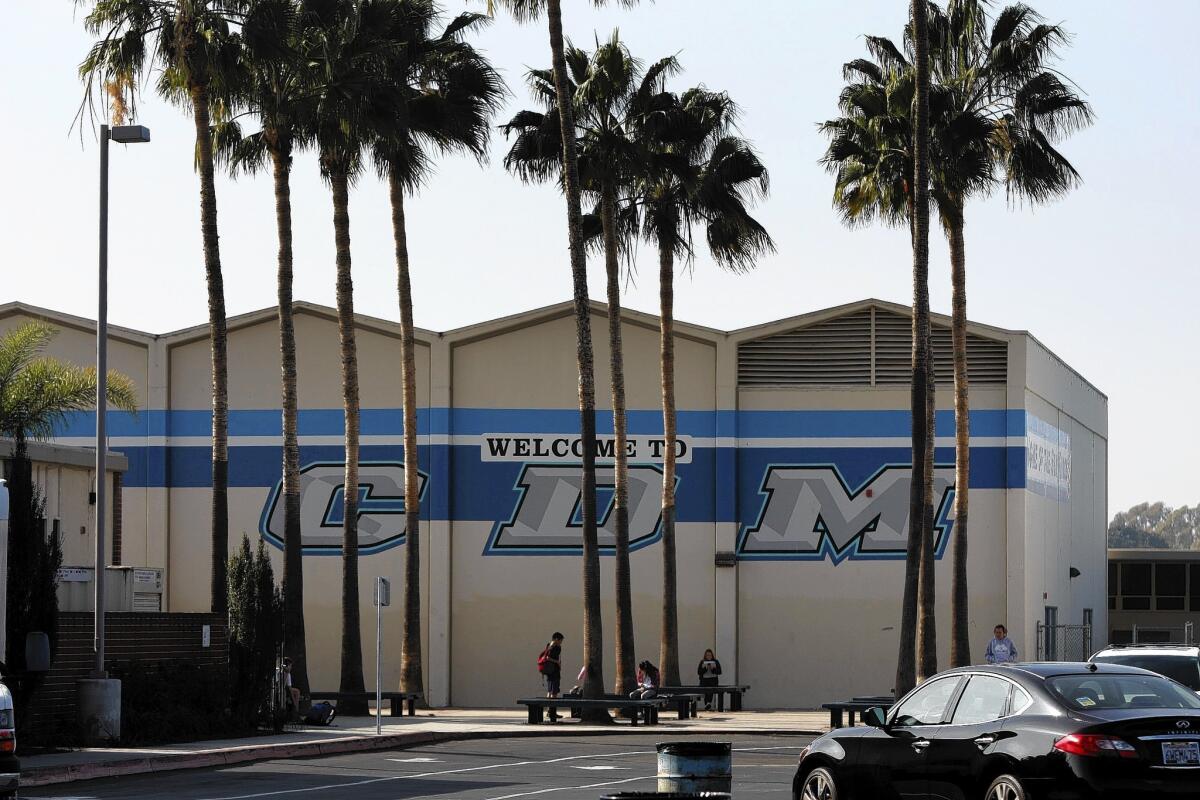Applicants should come clean about cheating allegations, colleges say

The recent expulsions of 11 students from an Orange County high school because of a cheating scandal appeared to be a forceful stand against academic dishonesty. But that discipline also has focused attention on the murkier questions about whether, and how, colleges should be informed about applicants’ histories of misbehavior.
College admissions officials say the expelled students and others in similar situations should come clean quickly to schools they’ve applied to, and they should be prepared for the consequences, including the possibility of having acceptance letters revoked. Colleges are more likely to consider leniency if students confess upfront and promise better behavior rather than try to evade detection, they say.
The students’ self-reporting is important because high schools are increasingly reluctant to inform colleges about disciplinary issues and expulsions, experts say. Some high schools are under parental pressure, even with lawsuits, to keep those matters confidential. Colleges, meanwhile, want the truth about potential freshmen and will pursue hints of trouble, such as mid-year transfers to new high schools.
It is a murky area governed more by professional courtesy than any legal rules, experts say.
“This would be a time for a student to explain himself or herself,” said Philip A. Ballinger, the University of Washington’s director of undergraduate admissions. In deciding how to handle a confession about dishonesty or other infractions, colleges and universities want “an assurance or reasonable confidence that this is not a habitual action by the student, that it was a singular action.”
In cases involving allegations of systematic computer hacking, he said, applicants face a high hurdle since the dishonesty strikes “at the heart of the academic task, at the essence of education.”
The 11 students, including juniors and seniors, at Corona del Mar High School were reportedly part of a scheme in which the Newport-Mesa school district’s computer system was hacked to change grades and access exams. Officials say a tutor who the students worked with developed the plan.
One Newport-Mesa Unified School District administrator involved in handling the case has resigned in protest over the expulsions, saying that not all the 11 students were equally culpable and that the problem may be more far-reaching.
Corona del Mar school employees cannot release any information about a student’s disciplinary history to colleges without a parent’s permission, according to district policy.
But high schools have a professional and moral responsibility to report serious infractions even after a college has accepted a student, said David Hawkins, director of public policy and research for the National Assn. for College Admission Counseling. “Colleges really want to know about that,” he said.
At the minimum, high schools should say that a senior has moved to another campus and then let colleges seek out why, he and other officials say.
More than 500 colleges — but not UC or Cal State — use the Common Application, an online form that asks students, among other questions, to disclose suspensions, expulsions and criminal convictions and allows them to explain. The Common Application also seeks similar information from counselors.
High school policies range from full openness to non-disclosure, said Sarah Markhovsky, communications chair for the national Assn. of College Counselors in Independent Schools. High schools “attempt to balance the best interests of the student, the school, and the colleges,” said Markhovsky, who is a counselor at the private Severn School in Maryland.
High schools have become more reluctant to disclose disciplinary matters because of fears of being sued by parents and concerns about the school’s reputation, said Jerome Lucido, executive director of the USC Center for Enrollment Research, Policy, and Practice. “High schools have gotten risk averse,” he said.
But Lucido, who previously oversaw admissions at USC, added that disgruntled families of well-behaved students who were rejected by a college sometime act as whistle-blowers about infractions of accepted students.
Matthew Fissinger, Loyola Marymount University’s director of undergraduate admission, said cases of applicants who transferred in the middle of their senior year in high school are rare and “raise a red flag.” The university asks students to explain and, if not satisfied, query high schools. Fissinger acknowledged that he can’t compel high schools to provide details.
Being caught cheating doesn’t automatically revoke an admission offer, Fissinger said. “I would be remiss in my duties if I didn’t try to get to the bottom of what happened, but we would want to understand what role the individual students played. We would make decisions on a case-by-case basis,” he said.
Yet many colleges report that they find it hard to forgive a central role in a widespread grade hacking case and consider it much worse, for example, than copying another student’s exam answers.
At Boston College, undergraduate admissions director John Mahoney said his office understands that “kids are kids and kids make mistakes.” So the college may not rescind admission offers for a one-time violation like getting drunk at the senior prom if the applicant makes amends. However, significant cheating during senior year may be “too egregious.”
The UC and Cal State systems do not ask for personal recommendations from teachers or counselors. Plus, applicants self-report their grades, which are not checked until after they are accepted. Those policies and the volume of applications at large public institutions make it harder to detect disciplinary problems, said UC spokeswoman Dianne Klein.
Still, admissions offers are regularly rescinded because of discrepancies in transcripts, cheating and questions about sudden transfers, she said. “I can’t tell you with 100% certainty that everyone who behaves badly and criminally is found out,” Klein said. But enough issues are uncovered that applicants should disclose their problems and attempt to explain them, she said.
High schools have another reason to disclose: to maintain good relations with colleges. Colleges may become suspicious of a high school’s recommendations if the school appears to be less than forthcoming, said Michael McKeon, admissions dean at St. Mary’s College of California in Moraga. “Most selective institutions have long memories,” he said.
Times Community News reporter Hannah Fry contributed to this report.
More to Read
Start your day right
Sign up for Essential California for news, features and recommendations from the L.A. Times and beyond in your inbox six days a week.
You may occasionally receive promotional content from the Los Angeles Times.








